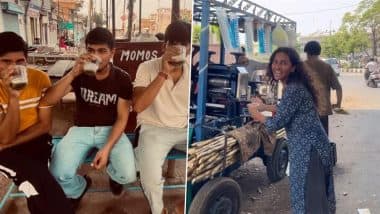Telangana and several parts of India are experiencing an intense heatwave with temperatures soaring past 44°C in multiple areas. The India Meteorological Department (IMD) has issued both orange and yellow warnings, underscoring the seriousness of the heat conditions and advising the public to remain cautious. With forecasts indicating that the scorching weather will continue in the days ahead, authorities are increasingly concerned about its impact on health and overall public well-being. Northern, central, and eastern parts of India are grappling with soaring temperatures, as states like Delhi, Uttar Pradesh, Bihar, Odisha and areas of Madhya Pradesh face official heat alerts. Many of these regions have recorded daytime highs exceeding 43°C, intensifying concerns about the ongoing spell of extreme heat. Severe heatwave alerts pose significant health hazards, especially to vulnerable populations such as the elderly, children, outdoor workers and those with pre-existing health conditions.슬롯 머신 사이트 추천Heatwave Alert Across India: IMD Issues Heat Wave Warning, Check List of States Where Temperatures Likely To Rise.
How Severe Heatwaves Are Danger For Health?
A heatwave is typically defined as a prolonged period of excessively hot weather which may be accompanied by high humidity. This weather pattern can severely strain the human body, especially when nighttime temperatures remain high and offer little relief. When the body fails to cool down effectively, it can trigger a chain of dangerous conditions including cramps, dizziness, confusion and in severe cases, loss of consciousness or organ failure. Individuals with heart conditions, asthma or respiratory issues face elevated risks.슬롯 머신 사이트 추천Weather Forecast: IMD Issues Rainfall, Severe Heatwave Alert in These States Till April 26; Check Details Here.
Tips To Stay Safe During Severe Heatwave
1. Stay Hydrated: Drink plenty of water throughout the day, even if you don슬롯사이트�t feel thirsty. Avoid alcohol, caffeine and sugary drinks as they can increase dehydration.
2. Limit Outdoor Activities: Try to stay indoors during the peak heat hours, typically between 11 AM and 4 PM. If you must go outside, take frequent breaks in the shade and wear a wide-brimmed hat and light-coloured, loose-fitting clothing.
3. Use Cooling Methods: Use fans, air conditioning or cool showers to lower your body temperature. Placing a wet towel around your neck or soaking your feet in cool water can also help.
4. Keep Your Living Space Cool: Close curtains or blinds to block out direct sunlight and use cross-ventilation or air conditioning to keep rooms cool. During power outages, seek cooler shelters such as public libraries or malls, if accessible.
5. Monitor At-Risk Individuals: Check in regularly with elderly family members, neighbours and others who might be living alone. Children and pets should never be left in parked vehicles, even for a few minutes.
6. Eat Light: Opt for smaller, lighter meals that are easier to digest and incorporate more fruits and vegetables with high water content like cucumbers, melons and oranges.
Heatwaves are more than just an inconvenience, they are a serious environmental and health hazard. As climate patterns continue to shift, preparing for extreme heat must become a priority at both individual and community levels.
(Disclaimer: This article is written for an informative purpose and should not be substituted for medical advice. Kindly consult your doctor before trying any tips.)
(The above story first appeared on LatestLY on Apr 24, 2025 08:24 AM IST. For more news and updates on politics, world, sports, entertainment and lifestyle, log on to our website latestly.com).













 Quickly
Quickly


















